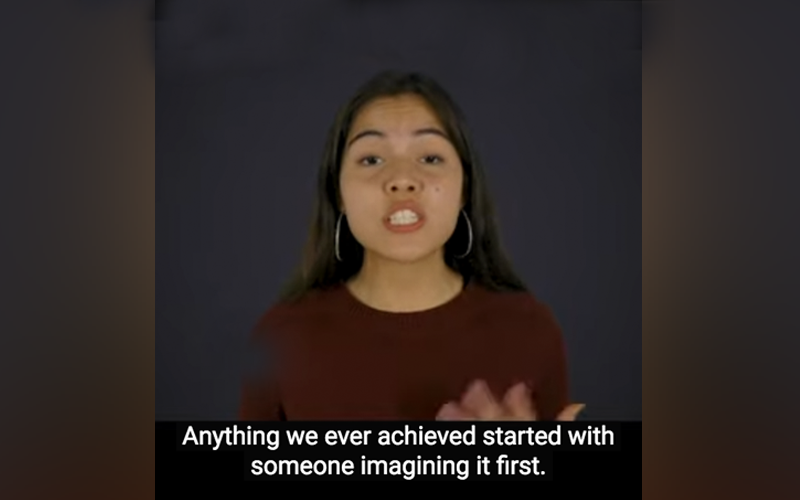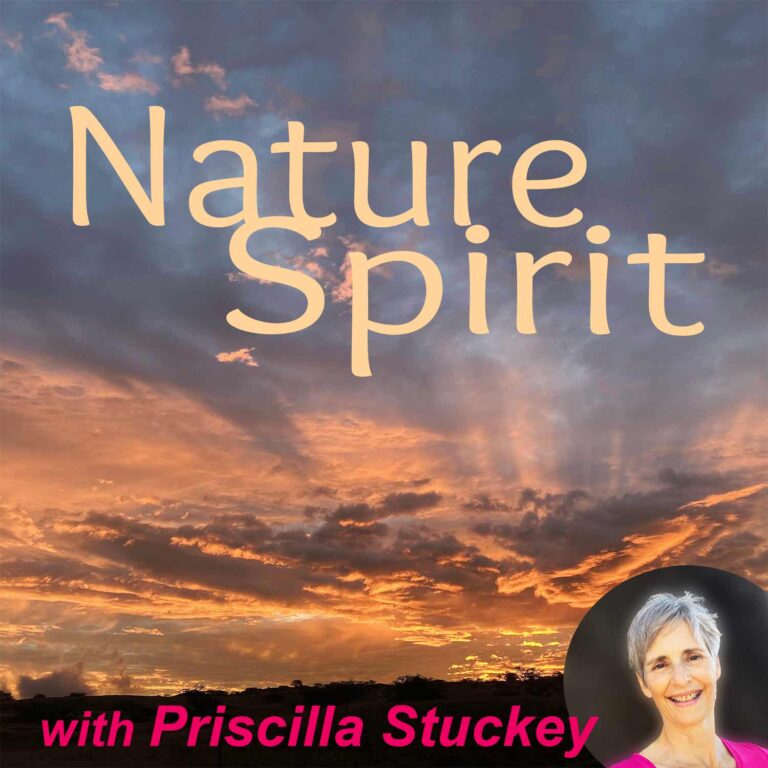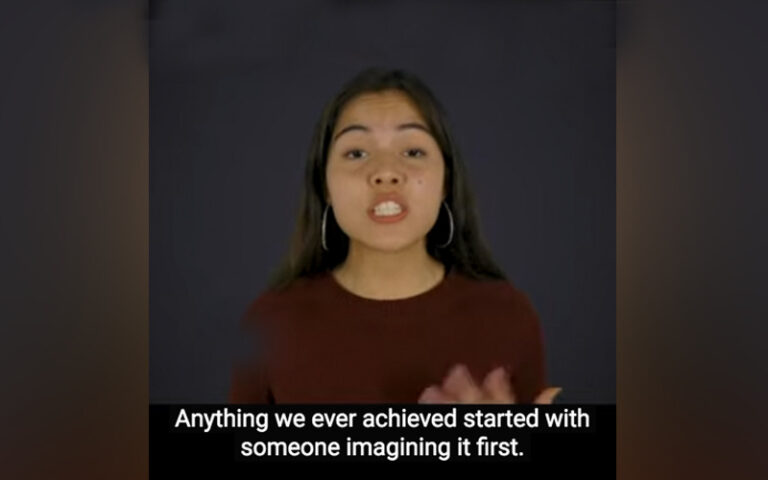Transcript
I’m listening hard these days to voices that have a lot to say about the Earth crises we’re in. Voices that are sharing a wealth of ideas about where to go from here. Many of those voices belong to Indigenous people and young people.
And what I hear from all of them sounds something like this: The values that are running the world right now are a choice. That’s good news; it means we’re not locked in to the destructive patterns we’re now following.
But—and here’s the challenging part—it will take a cultural shift to change our direction. It will take a shift in values.
So, can we shift our values? There’s a tendency in dominant white culture to think that the rules our society plays by are just inevitable. We look at capitalism, multinational corporations exploiting the Earth, the people who have too much taking even more. We say it’s greed. And we’re not wrong. But, the reasoning goes, greed is only human. It’s universal. So, can we actually, as a species, get out of this mess? Can we make different choices?
If you see the problem as one of human nature, the answer is no. But that’s the wrong way of analyzing the problem.
And that is exactly why I spend a lot of time listening to Indigenous voices. Because every one of them stands as a clear reminder that when it comes to relationship with the Earth, their people do things differently. Wherever in the world their people live, whether Latin America, North America, Australia, Africa, Asia, every Indigenous group offers a clear alternative to Western ways. They operate by different rules. They choose different values—and they have done so for generations.

So this week I listened first to the voice of Xiye Bastida, an eighteen-year-old climate activist based in New York. Xiye is an organizer of the Friday school strikes for climate. She grew up in the highlands of Mexico in a town of ten thousand; she’s a member of the Indigenous Otomi-Toltec nation.
“I was raised with this understanding that we had to take care of our surroundings,” Xiye said in a recent TED hour. “We had to thank the Earth for everything that it’s providing for us.” She says her family would go out to the lake for a picnic, and her mom would take out the tortillas.
“And so the prayer would begin,” Xiye says. “Thank you to Mother Earth for gifting us with air, water, and the places for our food to grow. Thank you to the hands who planted the seeds. Thank you to the hands who harvested the corn. Thank you to the hands who made the tortillas and for the transportation that it took for all of us to come together and share this beautiful moment. That is how I grew up,” Xiye says. “With a mindset that we have to thank the Earth, because it gives us everything we need to live, and all that it asks is that we protect.”
Thanking the Earth is not a traditional value in white American culture. But it could be.
Expressing appreciation for the generosity of the Earth is not a traditional value in white American culture. But it could be.
Protecting the land and keeping it healthy and free of poison is not a traditional value in American society. But it could be.
This week I listened as well to Nemonte Nenquimo, of the Waorani people of the Amazon rainforest. She wrote a letter to world leaders that was published in the Guardian, and she has some pointed words for Western cultures. “The whole planet is in trouble,” she says, “because you do not respect it.”
She says respect for the intricate life processes of the forest gets instilled in every child in her community as they are growing up. “I won’t be able to teach you,” she writes, about what her people know about living on Earth, but, she says, “it has to do with thousands and thousands of years of love for this forest, for this place. Love in the deepest sense, as reverence. This forest has taught us how to walk lightly, and because we have listened, learned and defended her, she has given us everything: water, clean air, nourishment, shelter, medicines, happiness, meaning.”
I strongly encourage looking up her letter and reading the whole piece. It’s a bracing reminder that what Western society and our corporations are doing around the world is a choice. We could choose different values; other peoples do.
Respect for the Earth, loving the Earth, reverence for the intricate life processes on Earth—these are not traditional values in Western society. But they could be.
Finally, I listened this week to an Indigenous scholar from the 1800s, from a region of the country where I used to live. Simon Pokagon was a Potawatomi scholar and writer whose people belonged to the Great Lakes areas of northern Indiana and Michigan. I recognized the name Pokagon because I used to visit the Pokagon State Park, which is named, it turns out, for Simon’s father, Chief Pokagon.
In 1893 Simon Pokagon wrote a booklet on the occasion of the Chicago World’s Fair, for the four hundredth anniversary of the arrival of Columbus. His booklet is remarkable because he had it printed on birch bark—out of loyalty to his people, he wrote, because they valued birch bark more highly than paper “because it could not be injured by sun or water.” I found a photographic copy of the booklet online and scrolled through its pages this week. I recommend doing this; it is a moving and eloquent document.
Simon Pokagon called his booklet The Red Man’s Rebuke, and much of it talks about how, during his lifetime, he watched white people move in and decimate the land, and how he mourned these losses. As “the cyclone of civilization rolled westward,” he wrote, “the forests of untold centuries were swept away; streams dried up; lakes fell back from their ancient bounds.” And yet the flood of white people continued, with their guns like thunder. Birds and beasts, he said, “were shot for love of power to kill alone, and left to spoil upon the plains.”
“Shot for love of power to kill alone”: the phrase caught me up short with its truthfulness. I remembered the passenger pigeons, once so thick in eastern North America that a single cloud of them could blot out the light of the sun. At the beginning of the 1800s, there were three billion; a hundred years later, zero. Extinct. Often they were shot just for the love of killing.
Preserving wildlife, loving the birds and animals, and enhancing the land for wildlife are not traditional values in American culture. But they could be.
What is striking to me in all of these Indigenous voices is the humility that each people practices in the face of the complexity and wonder of life on Earth—and how that humility is missing from Western culture. Nemonte Nenquimo says it plainly: “For Indigenous peoples it is clear,” she says, “the less you [white people] know about something, the less value it has to you, and the easier it is to destroy. And by easy, I mean: guiltlessly, remorselessly, foolishly, even righteously. And this is exactly what you are doing to us as Indigenous peoples, to our rainforest territories, and ultimately to our planet’s climate.”
Practicing humility in the face of what we do not understand: this is not a traditional value in my culture. But it could be.
Values change when people find out the ones they’re living by don’t work anymore. And when that happens, a whole society can shift—and quickly. I think, for example, of smoking. Over the course of only a few decades, social support for smoking evaporated, and the whole social landscape shifted.
We’re right now beginning a similar drop in support for fossil fuel use—and once it catches on, we will see another dramatic shift. We’ll still have to live with the climate consequences of what we’ve burned, but there is so much opportunity right now to design societies that work better, with more humility, more reverence for human and animal and plant lives on this Earth.
The young people are leading the way. Xiye Bastida and others in the youth climate movement say they’re getting tired of adults asking them what to do; it’s too much responsibility for their young shoulders. So the young people are shifting the conversation toward intergenerational cooperation. “We want to work with you,” she says. “We want you to have internships for us. We want you to open your doors for us to come in and have a say.”
The energy of young people active in the channels organized by adults—it’s a formula for rapid change—exactly the speed of change we need to address the climate crisis.
Xiye and other young people are delaying their dreams because the emergency is upon us. “The planet is suffering,” she says. “And we don’t have the luxury of time anymore. I truly feel that if all of us took care of the Earth, as a practice, as a culture, none of us would have to be full-time climate activists.”
So it comes back to shifting the cultural values. Xiye adds, “When the school curriculum teaches us that taking care of the Earth is part of our humanity, maybe I can do gymnastics once again.”
And she reminds us that it starts with the values we show children from little on up. She writes to her grandmother in Mexico, “Thank you, Abuelita, for inviting me to love the world since the moment I was born.”
Loving the Earth? It’s not a traditional value now. But it could be.
For digging deeper
Listening to Xiye Bastide will reignite your hope for change. Highly recommended: “Xiye Bastida: How Are Young People Making the Choice to Fight Climate Change?” on TED Radio Hour, May 22, 2020. Her letter to her grandmother is titled, “If You Adults Won’t Save the World, We Will,” TED talk, July 2020.
Nemonte Nenquimo’s letter in the Guardian appeared on Monday, Indigenous Peoples’ Day, Oct. 12, 2020: “This Is My Message to the Western World—Your Civilisation Is Killing Life on Earth.”
I discovered Simon Pokagon’s work in an article this week by Bradford Kasberg, “Working to Restore Bird Habitat, I Carry On Traditions That Were Meant to Be Erased,” in Audubon News. Bradford is a citizen of the Miami Tribe of Oklahoma and a wetland restoration manager for Audubon Great Lakes.
You can see the birch-bark booklet of the Red Man’s Rebuke up close and scroll through its pages at the Internet Archive.
The Indiana History Blog of the Indiana Historical Bureau at the state library includes a great post, “Flocks That Darken the Heavens,” on passenger pigeons in the 1700s and 1800s in Indiana. The post includes period paintings of flocks of the birds in the sky.
















